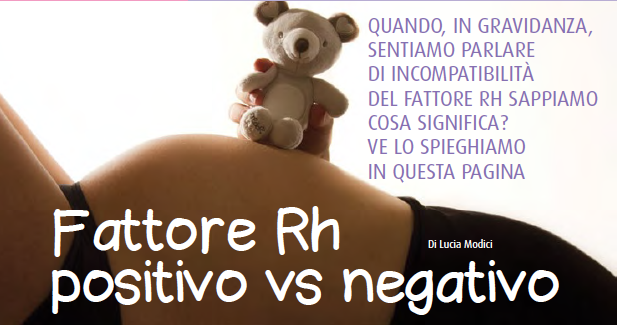 Other immunizing events can be represented by spontaneous abortions, threatened abortion, abdominal trauma or obstetric maneuvers for the cephalic inversion of the fetus. When a Rh negative woman has a Rh positive partner, in case of pregnancy she must undergo the indirect Coombs test every month, a test that reveals the possible presence in the blood of anti-D antibodies against the Rh positive of the fetus. A positive test means that the mother is producing antibodies against the red blood cells of the fetus, but their presence is only worrying if it exceeds certain levels, and the gynecologist will evaluate each case. To avoid the risk of immunization of the Rh negative mother with Rh positive child, the so-called immunoprophylaxis is carried out, the administration of specific immunoglobulins against the Rh factor capable of blocking the production of anti-D antibodies. As a rule, immunoprophylaxis is performed within 72 hours of the immunizing event (for example childbirth), but some centers - following what is suggested by the guidelines for physiological pregnancy of the Ministry of Health - offer it routinely to all Rh women negative at 28 weeks.
Taken from Born Mom | by Lucia Modici
Other immunizing events can be represented by spontaneous abortions, threatened abortion, abdominal trauma or obstetric maneuvers for the cephalic inversion of the fetus. When a Rh negative woman has a Rh positive partner, in case of pregnancy she must undergo the indirect Coombs test every month, a test that reveals the possible presence in the blood of anti-D antibodies against the Rh positive of the fetus. A positive test means that the mother is producing antibodies against the red blood cells of the fetus, but their presence is only worrying if it exceeds certain levels, and the gynecologist will evaluate each case. To avoid the risk of immunization of the Rh negative mother with Rh positive child, the so-called immunoprophylaxis is carried out, the administration of specific immunoglobulins against the Rh factor capable of blocking the production of anti-D antibodies. As a rule, immunoprophylaxis is performed within 72 hours of the immunizing event (for example childbirth), but some centers - following what is suggested by the guidelines for physiological pregnancy of the Ministry of Health - offer it routinely to all Rh women negative at 28 weeks.
Taken from Born Mom | by Lucia Modici

First of all, it is necessary to define what the Rh factor is: a group of molecules which may or may not be present on the surface of red blood cells. Rh is positive if the factor is present, negative if it is absent. In daily life, this has little relevance (only attention in the case of blood transfusion, but this too is an uncommon eventuality). When, on the other hand, a pregnant woman is Rh negative, the so-called Rh factor incompatibility could occur: it is a condition in which the mother is Rh negative while the fetus is Rh positive , a situation due to the fact that the child has inherited this feature from the positive dad .
The risk occurs when the Rh negative mother comes into contact with the blood of the Rh positive fetus: by recognizing the baby's red blood cells as foreign, the mother can begin to produce anti-D antibodies to counter them. The phenomenon is called immunization of the mother. This can happen during childbirth (therefore without consequences), but also before, during tests such as amniocentesis or CVS , or during subsequent pregnancies if the fetus is again Rh positive, given that the mother's body, in the time between the two gestations, produced antibodies as a result of the first birth. In these cases, the mother's antibodies cross the placenta and reach the fetal blood, destroying the red blood cells (anaemia): a condition called haemolytic disease of the fetus-neonatal , which can also lead to stillbirth of the fetus.  Other immunizing events can be represented by spontaneous abortions, threatened abortion, abdominal trauma or obstetric maneuvers for the cephalic inversion of the fetus. When a Rh negative woman has a Rh positive partner, in case of pregnancy she must undergo the indirect Coombs test every month, a test that reveals the possible presence in the blood of anti-D antibodies against the Rh positive of the fetus. A positive test means that the mother is producing antibodies against the red blood cells of the fetus, but their presence is only worrying if it exceeds certain levels, and the gynecologist will evaluate each case. To avoid the risk of immunization of the Rh negative mother with Rh positive child, the so-called immunoprophylaxis is carried out, the administration of specific immunoglobulins against the Rh factor capable of blocking the production of anti-D antibodies. As a rule, immunoprophylaxis is performed within 72 hours of the immunizing event (for example childbirth), but some centers - following what is suggested by the guidelines for physiological pregnancy of the Ministry of Health - offer it routinely to all Rh women negative at 28 weeks.
Taken from Born Mom | by Lucia Modici
Other immunizing events can be represented by spontaneous abortions, threatened abortion, abdominal trauma or obstetric maneuvers for the cephalic inversion of the fetus. When a Rh negative woman has a Rh positive partner, in case of pregnancy she must undergo the indirect Coombs test every month, a test that reveals the possible presence in the blood of anti-D antibodies against the Rh positive of the fetus. A positive test means that the mother is producing antibodies against the red blood cells of the fetus, but their presence is only worrying if it exceeds certain levels, and the gynecologist will evaluate each case. To avoid the risk of immunization of the Rh negative mother with Rh positive child, the so-called immunoprophylaxis is carried out, the administration of specific immunoglobulins against the Rh factor capable of blocking the production of anti-D antibodies. As a rule, immunoprophylaxis is performed within 72 hours of the immunizing event (for example childbirth), but some centers - following what is suggested by the guidelines for physiological pregnancy of the Ministry of Health - offer it routinely to all Rh women negative at 28 weeks.
Taken from Born Mom | by Lucia Modici
 Other immunizing events can be represented by spontaneous abortions, threatened abortion, abdominal trauma or obstetric maneuvers for the cephalic inversion of the fetus. When a Rh negative woman has a Rh positive partner, in case of pregnancy she must undergo the indirect Coombs test every month, a test that reveals the possible presence in the blood of anti-D antibodies against the Rh positive of the fetus. A positive test means that the mother is producing antibodies against the red blood cells of the fetus, but their presence is only worrying if it exceeds certain levels, and the gynecologist will evaluate each case. To avoid the risk of immunization of the Rh negative mother with Rh positive child, the so-called immunoprophylaxis is carried out, the administration of specific immunoglobulins against the Rh factor capable of blocking the production of anti-D antibodies. As a rule, immunoprophylaxis is performed within 72 hours of the immunizing event (for example childbirth), but some centers - following what is suggested by the guidelines for physiological pregnancy of the Ministry of Health - offer it routinely to all Rh women negative at 28 weeks.
Taken from Born Mom | by Lucia Modici
Other immunizing events can be represented by spontaneous abortions, threatened abortion, abdominal trauma or obstetric maneuvers for the cephalic inversion of the fetus. When a Rh negative woman has a Rh positive partner, in case of pregnancy she must undergo the indirect Coombs test every month, a test that reveals the possible presence in the blood of anti-D antibodies against the Rh positive of the fetus. A positive test means that the mother is producing antibodies against the red blood cells of the fetus, but their presence is only worrying if it exceeds certain levels, and the gynecologist will evaluate each case. To avoid the risk of immunization of the Rh negative mother with Rh positive child, the so-called immunoprophylaxis is carried out, the administration of specific immunoglobulins against the Rh factor capable of blocking the production of anti-D antibodies. As a rule, immunoprophylaxis is performed within 72 hours of the immunizing event (for example childbirth), but some centers - following what is suggested by the guidelines for physiological pregnancy of the Ministry of Health - offer it routinely to all Rh women negative at 28 weeks.
Taken from Born Mom | by Lucia Modici
Categorie del blog
Volantino Iperbimbo


